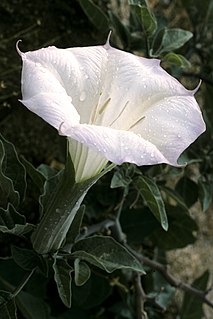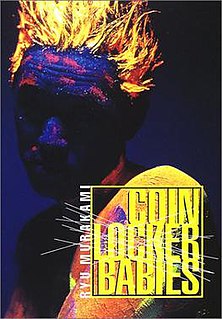Datura is a genus of flowering plants.
Datura may also refer to:
- Datura (band), an Italian dance group
- "Datura (song)", a Tori Amos song
- 1270 Datura, an asteroid
- Datura (video game), a video game.
Datura is a genus of flowering plants.
Datura may also refer to:
Alien primarily refers to:

Datura is a genus of nine species of poisonous, vespertine-flowering plants belonging to the nightshade family Solanaceae. They are commonly known as thornapples or jimsonweeds, but are also known as devil's trumpets. Other English common names include moonflower, devil's weed, and hell's bells. All species of Datura are poisonous and potentially psychoactive, especially their seeds and flowers, which can cause respiratory depression, arrhythmias, fever, delirium, hallucinations, anticholinergic syndrome, psychosis, and even death if taken internally. Due to their effects and symptoms, they have occasionally been used not only as poisons, but also as hallucinogens by various groups throughout history. Traditionally, psychoactive administration of Datura species has often been associated with witchcraft and sorcery or similar practices in many cultures, including the Western world. Certain common Datura species have also been used ritualistically as entheogens by some Native American groups. Nonpsychoactive use of the plant is usually done for medicinal purposes, and the alkaloids present in plants of the Datura genus have long been considered traditional medicines in both the New and Old Worlds due to the presence of the alkaloids scopolamine and atropine, which are also produced by Old World plants such as Hyoscyamus niger, Atropa belladonna, and Mandragora officinarum.

Datura stramonium, known by the common names thorn apple, jimsonweed, devil's snare, or devil's trumpet, is a species of flowering plant in the nightshade family Solanaceae. Its likely origin was in Central America, and it has been introduced in many world regions. It is an aggressive invasive weed in temperate climates across the world. D. stramonium has frequently been employed in traditional medicine to treat a variety of ailments. It has also been used as a hallucinogen, taken entheogenically to cause intense, sacred or occult visions. It is unlikely ever to become a major drug of abuse owing to effects upon both mind and body frequently perceived subjectively as being highly unpleasant, giving rise to a state of profound and long-lasting disorientation or delirium with a potentially fatal outcome. It contains tropane alkaloids which are responsible for the psychoactive effects, and may be severely toxic.
Halo generally refers to:
Angel's trumpet may refer to:
Civil War may refer to:
Walking Dead or The Walking Dead may refer to:
A dune is a hill of sand.
Goldeneye may refer to:

Deliriants are a class of hallucinogen. The term was coined in the early 1980s to distinguish these drugs from psychedelics and dissociatives such as LSD and ketamine, due to their primary effect of causing delirium, as opposed to the more lucid and less disturbed states produced by other types of hallucinogens. The term generally refers to anticholinergic drugs, which are substances that inhibit the function of the neurotransmitter acetylcholine. Common examples of deliriants include plants of the genera Datura and Brugmansia as well as higher than recommended dosages of diphenhydramine (Benadryl). Despite their long history of use, deliriants are the least-studied class of hallucinogens in terms of their behavioral and neurological effects.
Moonflower may refer to:

Coin Locker Babies, 1980, is a novel by Ryū Murakami about coin-operated-locker babies, translated into English by Stephen Snyder. The translation was published in 1995 by Kodansha International Ltd and republished in 2013 by Pushkin Press. A Bildungsroman novel, Coin Locker Babies is known for transcending genres, containing elements of social commentary, surrealism, dark comedy, philosophy, noir and horror.
Shuffling is a procedure used to randomize a deck of playing cards.
Hell's Bells or Hells Bells may refer to:
A god of war is a deity associated with war.
Heroes or Héroes may refer to:
"Dātura" or "Datura" is a song written and recorded by American singer Tori Amos. It is the ninth song of Amos's fifth record To Venus and Back, which was released in September 1999. It is included in the first disc of the double album subtitled "Orbiting" that contains eleven original studio recordings. The song lists the names of the plants found in Amos's garden and was created during the recording sessions of To Venus and Back. The song's title refers to datura, a plant known for its toxic and hallucinogenic properties. Amos has never performed the song live due to its complex structure and time signatures which makes it hard to reproduce with a live band. However, in 2011 Amos incorporated the "room in my heart" bridge when performing "Take to the Sky" during her concert in Brussels on October 29, 2011 Video on YouTube. She also performed the song in a similar fashion throughout the Unrepentant Geraldines Tour and again on the Native Invader Tour.
Just Dance may refer to:

Datura is a 2012 first-person adventure game developed by Plastic and published by Sony Computer Entertainment for PlayStation 3.